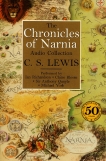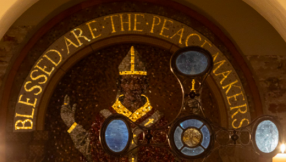A recent series of articles on this site painted a rather depressing (but truthful) picture of the state of Christian fiction. But perhaps it's not the whole picture. There are some exciting developments that show there are authors that are managing to marry quality and risk-taking while staying true to their faith.
One such development is UK-based imprint Lion Fiction. It was borne out of a merger between Lion and Angus Hudson; the latter had ceased to publish fiction because big secular publishers were buying out its best authors.
Since March 2013 Lion publisher Tony Collins has been developing an imprint that focuses on books that assume an underlying Christian worldview but are not constrained to carry a Christian 'message'.
Lion Fiction titles cover the whole spectrum of genres including crime, thriller, fantasy and drama.
Collins wanted to respond to some of the criticisms our previous articles raised, particularly the issue of a 'profanity-free zone', with the implication that an unreal, cozy world view was stifling creativity:
"I read incredibly widely for my job but there is material out there that I wouldn't want on TV or in my mind. Why pretend that that is reality? That's just saying we must do what the world does, which is a travesty. I started Lion Fiction because I wanted to produce really good books.
"You don't have to include profanity or explicit sex to tell a good story or to sell a good book," he adds. "Nor do you have to cater exclusively for the ultra-sensitive. We are trying to find great stories that set the pulse racing and captivate and satisfy the reader, partly because they have a redemptive core. It's not easy, but they are there to be discovered."

Lion Fiction first came to my attention when I heard about the book Mortal Fire by Claire Dunn, which won Gold in the ForeWord Book Of The Year Awards, 2012. Collins explains why he signed Dunn:
"Choosing novels is more art than science, especially where new authors are concerned. Yet I have long held to the view that a publishing programme needs new blood in order to remain vigorous, and publishers (and preachers) who take no risks grow deaf to the Spirit.
"When the text now published as Mortal Fire was first sent to me, speculatively, I gave it the usual scrutiny that all new fiction must pass. Was it evidently kooky? No. Did it pass the vocabulary test? Could the author use words? Yes, and yes. Did it hold the attention, on a cursory read of the first few pages? Indeed: a death, and pithy detail, and a strange encounter. A sureness of tone.
"At this point I sighed, realising that this was not a book to be swept aside, and downloaded it to my Kindle for a proper read. Later I gave it the accolade that very few books merit, or require: I turned back to the beginning, and started again."
Dunn's series,The Secret of the Journal, of which there are three titles now published with the fourth due next year, has an 'other worldly' sense about it.
At its heart is a young English academic from Cambridge, Emma D'Eresby, who travels to a remote but prestigious college in Maine to teach history. Her speciality is the rather gruesome history of religious persecution. But Emma has an ulterior motive. She is obsessed by a 17th-century journal held in the college's library. As she delves into its pages, she discovers secrets that threaten to bring her into conflict with the present.
Dunn explains more about how she came to write the books: "When faced with the disfigured tomb of a medieval knight lying in a little English church many years ago, it was a simple step for me to imagine a story in which the jealousy of a younger brother led to conflict with long-lasting and devastating results."
It is relationships, and "their power to heal or divide", she says, that form the backbone of her series.
"I write books about people – the choices they make, both good and bad, and how those choices influence the present. This aspect is particularly important: that my central characters do not always make the right choices. They make mistakes and sometimes – even knowing it is wrong – continue to do so. Yet their faith is important to them and they try to live guided by it."
Dunn believes that it the characters' humanity, their struggles, compromises and efforts to put wrongs right again, that is key to her writing because it reflects life as we all experience it – irrespective of the fact that we live in a different century to the people in her novels.
Her faith is an intrinsic part of the writing process: "I set out to write books for the general market – wait, scrap that – I set out to write books for people irrespective of their beliefs or none, but I do so as a Christian, and can no more divorce my writing from my faith than I can the blood running through my body."
Interestingly, Dunn does not view her books as safe alternatives to secular fiction and purposefully avoided setting artificial boundaries that she knew would restrict her readership:
"Re-writing reality to reflect an idealised existence does little to further the cause of either Christian literature or God's Kingdom, but reinforces the image of anodyne and mediocre books devoid of real characters and depth of plot. Is this how Christians wish to be seen?"
She also recognises that "many Christians do not want Christian books per se, but books with what might be termed a moral code running through them".
She knows that it "takes an exceptional publisher to push the boundaries of Christian fiction. But the rewards are there in a growing number of readers expressing a desire for good fiction with an authentic, original voice."
Collins agrees that authors and publishers have to be willing to take risks and be original. But with customers who often have strict ideas about what is acceptable he explains there are restrictions that Lion Fiction has to operate within.
"Most of our books are sold in the general market. Nevertheless, there is a significant Christian network and some of that is hyper sensitive so overt sex is out, overt bad language too – they can be covertly erotic, imply bad language but more to the point there is a hunger for good books. Books don't have to include sex and bad language for them to be good. We don't have to conform to the world's standards."
Collins recognises that starting a new imprint has had its difficulties: "The real challenge we are facing is the task of finding new people. Normally a publisher would have an established stable but Lion Fiction has started from scratch. We were hoping to draw upon the range of fiction generated by US writers. But because the Christian world in the States is very confessional and self-consciously Christian there have been very few proposals from US authors that have met our criteria. It has proved difficult but it is also exhilarating as we are able to give chances to new novelists."
Some of those new novelists include Edoardo Albert, Beth Moran, Anna Thayer and Elizabeth Flynn. Between them they have covered the historical fiction, fantasy and crime genres and have received five star reviews for their work. They, too, have their own thoughts on the state of Christian fiction.
Albert doesn't pull any punches: "To be honest, I pretty much agree with [author of the articles on Christian Today] Michael Trimmer: most Christian fiction is dire and I wouldn't go near it with a knackered Kindle. But the interesting question is why it is dreadful. To answer this, let's look at Philip Pullman!
"His Dark Materials ... suffers from exactly the same problem as most Christian fiction, except in Pullman's case he wants to bury God rather than praise Him – and he does this by, in the end, betraying the contract between reader and writer, while turning himself from artist to propagandist."
Albert believes that the degeneration he asserts can be found in Pullman's writing is directly attributable to his efforts to "browbeat the reader into accepting his views".
"To write stories with the express purpose of calling people to Christ is to betray the art of the storyteller, for the purpose of a story is the story itself, consistent with the world and people who inhabit it. Do we really want to turn into theistic versions of Pullman, dragging the reader to the destination we have determined for him or her? That is both a profound misunderstanding of the nature of writing and a betrayal of the paradoxical message of Christianity."
Beth Moran's book, Making Marion, has crossed over into the mainstream market since being published. Indeed the Publishers Weekly review said: "This is one of the best inspirational novels of the season, a marvellous debut by a British author to watch."
Moran says, "I am thrilled that Making Marion is finding a place in the mainstream market. Every day I write I pray that God will inhabit my words, that He will use them to speak truth to people, and invite them to look deeper, and begin to ask questions."
She reflects on the fact that Jesus' parables did not contain anything explicit about God in them: "People could hear them on many different levels and they were open to misinterpretation. Jesus used a brilliant story to get people thinking, and intrigued, and then they had to ask Him and to search for themselves if they wanted to know more. For the majority of the listeners, it was simply a great story."
Moran believes that Christian writers today can learn from Jesus' example, and have a great opportunity to reach the people who would never listen to a sermon:
"I think if a book is good enough, people will read it irrespective of the Christian content, (for example like the Narnia books, or Les Misérables). They either won't notice, won't care or will be blessed and intrigued by it. Some people will hate it – but whatever I write some people are going to hate it!"
Anna Thayer is the first fantasy fiction author that Lion have published. She explains why she has chosen that genre: "The big draw for me is the possibilities opened by the 'perilous realm'. At their best, these stories give us the chance to explore and examine ideas, issues and situations that we might not be comfortable contemplating in our own lives.
"The genre's epic nature gives us a distance that permits contemplation, but also brings us achingly close to the action. It's this which allows us to look back at our own lives with what Tolkien calls 'renewed sight'."
Thayer also believes that the themes found in fantasy writing, including heroism and courage, right and wrong, mystery and morality, good and evil, love and loss, make it a great partner for Christian fiction, especially as those who like reading fantasy are usually open to contemplating some of the 'bigger questions' of life.
"The difficult part is to write in a way that is nourishing and challenging without being preachy or twee; to show the hope and confidence that God brings us without being saccharinely rose-tinted, to show how praise and prayer are the way through life's turbulence, however great the storm."
So, while it is true that the Christian marketplace is flooded with 'bonnet' fiction (and a lot of pretty awful books), there are Christian authors and publishers that are desperate to keep pushing the boundaries to produce well-crafted, well-written works of art.
Claire Dunn provides a great summary of the dilemma that Christian publishers – and authors – face today: "Carving out a new market is brave if it is successful, but foolhardy if it isn't, and banks don't back businesses unless there is a clear market for a product or service.
"There is a well-established, thriving market for Christian literature, but it knows what it likes and upsetting it could prove disastrous for the publisher who bucks the trend."
Dunn recognises that there are a few publishers that are sticking their necks out to back "original, well-written books (with or without Christian themes) which meet high standards of quality, and are establishing a toehold in this ultra-conservative market. This is the way forward, but is a long and uncertain road."
She believes that publishers need to trust writers more, allowing them to represent God through their work in the way they feel works best rather than being constrained by a set of rules, because "an author cannot be all things to all people and expect to keep both creative and personal integrity".
Dunn quite rightly points out that writers simply have the same responsibility as Christians in all other occupations: "We represent our faith not just through what we do, but in how we interact with the world".
She longs for the publishing world to be brave enough to "remove those corsets and let fresh books breathe some originality back into the industry". Her final thought echoes Moran's, by looking to Jesus for inspiration:
"Perhaps the greatest challenge to the industry comes from within: did Jesus go blindfolded through life untouched by the world? Did He take the known path, ask no questions, challenge no one? On the contrary, He reached out and took the world by its shoulders and shook it until it rattled. He didn't play safe. We – the authors, readers and publishers – are the history of tomorrow and the future of Christian literature lies in our hands."















